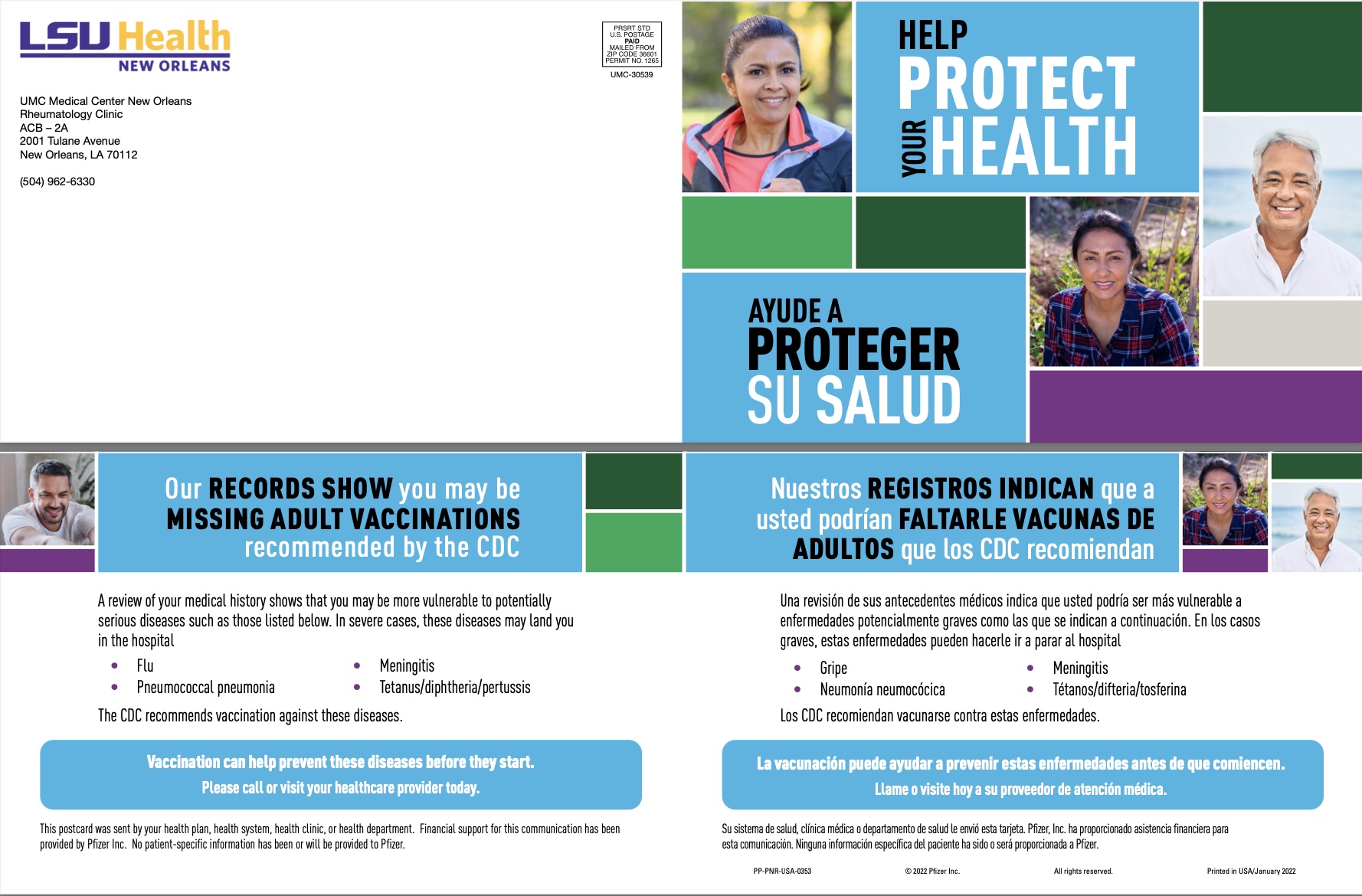Session Information
Date: Monday, November 13, 2023
Title: (1082–1099) Measures & Measurement of Healthcare Quality Poster I
Session Type: Poster Session B
Session Time: 9:00AM-11:00AM
Background/Purpose: Patients with inflammatory rheumatic diseases (IRDs) are at increased risk of infection. The Centers for Disease Control and Prevention (CDC) and the ACR strongly recommend vaccination to decrease risk of invasive Streptococcus pneumoniae infections. Vaccine hesitancy is common, has multiple causes, and made more evident by the recent pandemic. Younger adults ages 19-64, including those with IRDs, have reduced pneumococcal vaccine uptake even though it has been recommended for them since 2012. Recent CDC data from 2020 shows 67% of patients 65 years of age and older have the pneumococcal vaccination, but only 23.9% of patients ages 19-64. The objective of this project was to increase pneumococcal vaccination uptake in our high-risk patients in the 19-64 age range, in accordance with recommendations regarding the newer PCV20 vaccine. We hypothesized that using a targeted intense outreach strategy would increase vaccine uptake compared to the current standard of care.
Methods: The Vaccine Brief Intense Partnership (V-BIP) Program was created and started in January 2023. The program included a partnership between our clinic and industry. The target intervention population was identified by electronic health records. We identified unvaccinated patients seen in the University Medical Center- New Orleans Rheumatology Clinic January 2022- January 2023, ages 19-64. All patients without vaccination documentation were contacted using an automated call system and post cards were sent to their homes alerting them of their need to update their vaccinations. Post cards were mailed February and patient calls started March 2023. Number of calls and patient’s responses to call attempts are tracked, along with vaccination uptake in the original cohort from January- June 2023.
Results: Of the 1,464 rheumatology patients seen in that year ages 19-64, 580 or 39.6% were unvaccinated. Of the 580 unvaccinated patients, 138 or 26% have been successfully vaccinated within the first 4 months of the V-BIP quality improvement program. This represents a 10% increase in the receipt of the PCV20 vaccine in our 19-64 cohort. The entire automated vaccine promotion message was listened to by 65% of patients. Of postcards mailed, few were returned undeliverable. Increased awareness was discussed with providers, but no changes to the ongoing Epic Best Practice Advisory were made.
Conclusion: Our data demonstrates a significant increase in pneumococcal vaccination after a 4-month intervention of the V-BIP quality improvement project. The V-BIP program provided multi-point patient contact and information delivery, providing additional interaction with patients to increase awareness and the opportunity to schedule a vaccination appointment. The program will extend to the end of 2023. The project supports that partnerships with other entities, in addition to industry, such as specialty pharmacies, PBMs, and other organizations should be explored as ways to improve quality of care.
To cite this abstract in AMA style:
Pasch K, Lindsey S, Ferguson T. Improving Vaccine Uptake of the Pneumococcal 20-valent Conjugate Vaccine (PCV20) in Young Rheumatic Disease Patients Using a Brief Intense Partnership Program [abstract]. Arthritis Rheumatol. 2023; 75 (suppl 9). https://acrabstracts.org/abstract/improving-vaccine-uptake-of-the-pneumococcal-20-valent-conjugate-vaccine-pcv20-in-young-rheumatic-disease-patients-using-a-brief-intense-partnership-program/. Accessed .« Back to ACR Convergence 2023
ACR Meeting Abstracts - https://acrabstracts.org/abstract/improving-vaccine-uptake-of-the-pneumococcal-20-valent-conjugate-vaccine-pcv20-in-young-rheumatic-disease-patients-using-a-brief-intense-partnership-program/

